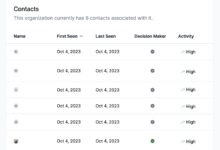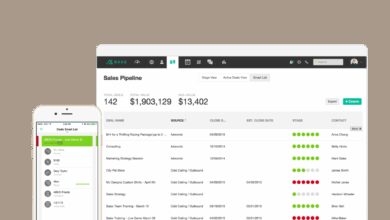Cloud Based CRM Benefits: 7 Powerful Advantages You Can’t Ignore
Discover the game-changing cloud based CRM benefits that are transforming how businesses connect with customers, streamline operations, and scale efficiently—all from the cloud.
1. Enhanced Accessibility and Remote Work Enablement

One of the most transformative cloud based CRM benefits is the ability to access critical customer data from anywhere, at any time. With a cloud-based system, sales, marketing, and support teams aren’t tied to a physical office or specific device. This flexibility has become essential in today’s hybrid and remote work environments.
Access from Any Device, Any Location
Cloud CRM platforms are designed to be device-agnostic, meaning users can log in from laptops, tablets, or smartphones as long as they have an internet connection. This universal access ensures that field sales reps can update client records after a meeting, customer service agents can respond to inquiries while working remotely, and managers can monitor team performance on the go.
- Real-time access to customer histories, notes, and interactions
- Seamless synchronization across multiple devices
- Support for global teams operating across different time zones
According to a report by Gartner, over 80% of organizations now rely on cloud-based tools to support remote collaboration, with CRM systems being among the most widely adopted. This shift underscores the importance of accessibility in modern business operations. Learn more about Gartner’s cloud adoption insights.
Support for Hybrid and Distributed Teams
The rise of hybrid work models has made traditional, on-premise CRM systems increasingly obsolete. Cloud based CRM benefits shine in environments where employees split their time between home and office or work entirely remotely.
With centralized data storage in the cloud, every team member accesses the same up-to-date information, eliminating the risk of outdated spreadsheets or lost client notes. This consistency improves coordination and reduces miscommunication.
cloud based crm benefits – Cloud based crm benefits menjadi aspek penting yang dibahas di sini.
- Real-time collaboration on customer accounts
- Automated updates ensure everyone sees the latest changes
- Integrated communication tools (like email, chat, and video) enhance teamwork
“The cloud has democratized access to enterprise-grade tools. A small startup in Jakarta can now use the same CRM technology as a Fortune 500 company in New York.” — TechCrunch, 2023
2. Cost Efficiency and Predictable Budgeting
One of the most compelling cloud based CRM benefits is the significant reduction in upfront and ongoing costs compared to traditional on-premise solutions. Businesses no longer need to invest heavily in servers, IT staff, or software licenses before they can start using a CRM.
Lower Upfront Investment
Traditional CRM systems often require large capital expenditures for hardware, installation, and customization. In contrast, cloud-based CRMs operate on a subscription model—typically billed monthly or annually per user.
This pay-as-you-go approach lowers the barrier to entry, especially for small and medium-sized businesses (SMBs). Instead of spending tens of thousands upfront, companies can start with a basic plan for as little as $10–$50 per user per month.
- No need to purchase physical servers or data centers
- Minimal setup costs and faster deployment
- Reduced dependency on in-house IT infrastructure
For example, platforms like Salesforce and Zoho CRM offer tiered pricing that scales with business needs, making them accessible to startups and growing enterprises alike.
Reduced Maintenance and IT Overhead
With a cloud-based CRM, the provider handles all backend maintenance, including software updates, security patches, and server management. This eliminates the need for dedicated IT staff to manage the system, freeing up internal resources for more strategic initiatives.
Additionally, automatic updates ensure that users always have access to the latest features without downtime or manual intervention.
cloud based crm benefits – Cloud based crm benefits menjadi aspek penting yang dibahas di sini.
- No manual software upgrades required
- Automatic backups and disaster recovery protocols
- Scalable infrastructure managed by the vendor
A study by Nucleus Research found that cloud CRM systems deliver an average return on investment (ROI) of $8.71 for every dollar spent—largely due to lower operational costs and faster implementation times.
3. Scalability to Match Business Growth
As businesses grow, their CRM needs evolve. One of the standout cloud based CRM benefits is the ability to scale seamlessly—up or down—based on organizational changes, seasonal demand, or market expansion.
Flexible User Management
Adding or removing users in a cloud CRM is typically a matter of a few clicks. Whether you’re onboarding a new sales team or downsizing during a restructuring, the system adapts quickly without requiring new licenses or hardware.
This flexibility is particularly valuable for seasonal businesses or those experiencing rapid growth. For instance, an e-commerce company preparing for the holiday rush can temporarily add support agents to handle increased customer inquiries and then scale back afterward.
- Instant provisioning of new user accounts
- Role-based access control for security and efficiency
- Easy integration with HR and onboarding systems
Adaptability Across Departments and Functions
Modern cloud CRMs are modular, allowing businesses to start with core sales automation and later add modules for marketing, customer service, inventory, or analytics. This adaptability ensures that the CRM grows with the company, rather than becoming a limiting factor.
For example, a startup might begin with a basic CRM for lead tracking but later integrate marketing automation, AI-powered insights, or telephony features as its customer base expands.
cloud based crm benefits – Cloud based crm benefits menjadi aspek penting yang dibahas di sini.
- Modular design supports phased implementation
- Integration with third-party apps via APIs and marketplaces
- Support for multi-divisional or multi-brand operations
“Scalability isn’t just about size—it’s about agility. The right CRM should grow with your vision, not constrain it.” — Forbes Technology Council
4. Real-Time Data Synchronization and Collaboration
In fast-moving sales and service environments, having access to the most current customer information is critical. Among the most impactful cloud based CRM benefits is real-time data synchronization across all users and devices.
Elimination of Data Silos
Traditional systems often result in fragmented data—sales using one tool, support another, and marketing relying on spreadsheets. This leads to inefficiencies, duplicated efforts, and inconsistent customer experiences.
A cloud CRM centralizes all customer interactions in one platform, ensuring that every department works from the same dataset. When a support agent logs a complaint, the sales team sees it immediately. When marketing launches a campaign, sales can follow up with leads in real time.
- Unified customer profiles with complete interaction history
- Automated data capture from emails, calls, and forms
- Elimination of duplicate entries and conflicting records
Improved Team Collaboration and Workflow Automation
Cloud CRMs often include built-in collaboration tools such as shared calendars, task assignments, internal messaging, and workflow automation. These features streamline internal processes and reduce reliance on external communication tools like email or Slack for CRM-related tasks.
For example, when a lead is qualified, the system can automatically assign it to a sales rep, create a follow-up task, and notify the manager—all without manual intervention.
- Automated task routing based on rules or triggers
- Real-time notifications and alerts
- Shared pipelines and dashboards for team transparency
Platforms like HubSpot CRM offer collaborative inbox features that allow teams to manage customer communications collectively, improving response times and service quality.
cloud based crm benefits – Cloud based crm benefits menjadi aspek penting yang dibahas di sini.
5. Advanced Security and Data Protection
Many businesses hesitate to move to the cloud due to security concerns. However, one of the most underrated cloud based CRM benefits is the superior level of security offered by reputable providers—often exceeding what most companies can achieve on-premise.
Enterprise-Grade Encryption and Compliance
Top cloud CRM vendors invest heavily in cybersecurity infrastructure. They employ end-to-end encryption for data in transit and at rest, multi-factor authentication (MFA), and regular security audits.
Additionally, many platforms comply with international standards such as GDPR, HIPAA, SOC 2, and ISO 27001, making them suitable for industries with strict regulatory requirements.
- Data encrypted using AES-256 or equivalent standards
- Regular penetration testing and vulnerability assessments
- Compliance certifications ensure legal and regulatory adherence
For example, Microsoft Dynamics 365 offers built-in compliance tools and data residency options, allowing organizations to control where their data is stored.
Automatic Backups and Disaster Recovery
Unlike on-premise systems, where backups depend on internal IT processes (which may be inconsistent), cloud CRMs perform automated, frequent backups. In the event of a system failure, cyberattack, or natural disaster, data can be restored quickly with minimal downtime.
Most providers offer service level agreements (SLAs) guaranteeing 99.9% uptime and rapid recovery times, ensuring business continuity.
cloud based crm benefits – Cloud based crm benefits menjadi aspek penting yang dibahas di sini.
- Daily or hourly automated backups
- Geographically distributed data centers for redundancy
- Disaster recovery plans tested regularly
“Cloud providers have more resources to dedicate to security than 90% of enterprises. Moving to the cloud can actually reduce your risk exposure.” — CSO Online
6. Faster Deployment and Time-to-Value
Time is money, especially when implementing new business software. Among the most practical cloud based CRM benefits is the speed at which these systems can be deployed and start delivering value.
Quick Setup and Onboarding
While traditional CRM implementations can take weeks or even months, cloud-based systems are typically ready to use within days. Most platforms offer intuitive setup wizards, pre-built templates, and guided onboarding processes.
Users can import existing contacts, customize fields, and start logging interactions almost immediately. This rapid deployment allows businesses to begin improving customer relationships without long delays.
- Self-service setup with minimal technical expertise required
- Pre-configured industry-specific templates
- Import tools for seamless data migration from spreadsheets or legacy systems
Immediate Access to Updates and New Features
Because cloud CRMs are centrally hosted, vendors can roll out updates, bug fixes, and new features automatically. Users don’t need to download patches or schedule downtime—improvements appear seamlessly in the background.
This ensures that businesses always have access to the latest innovations, such as AI-driven insights, voice integration, or predictive analytics, without additional cost or effort.
- Continuous delivery of new functionalities
- No disruption to daily operations during updates
- Early access programs for beta features
A report by IDC found that companies using cloud CRM achieve a 50% faster time-to-value compared to on-premise solutions, with some realizing ROI within the first three months of use.
cloud based crm benefits – Cloud based crm benefits menjadi aspek penting yang dibahas di sini.
7. Integration Capabilities and Ecosystem Expansion
No CRM operates in isolation. One of the most strategic cloud based CRM benefits is the ability to integrate with a wide range of third-party applications, creating a unified digital ecosystem.
Seamless Integration with Marketing, Sales, and Support Tools
Modern cloud CRMs offer native integrations or API access to popular tools like email platforms (Gmail, Outlook), marketing automation (Mailchimp, ActiveCampaign), telephony (Zoom, RingCentral), and e-commerce platforms (Shopify, WooCommerce).
These integrations enable data flow between systems, eliminating manual data entry and ensuring consistency across channels.
- Synchronize emails and calendar events directly with CRM records
- Sync customer behavior from websites and apps
- Automate lead capture from web forms and social media
App Marketplaces and Custom Development Options
Many cloud CRM providers host app marketplaces where users can discover and install extensions to enhance functionality. For example, Salesforce AppExchange offers over 3,000 apps, while Zoho Marketplace provides hundreds of integrations tailored to specific industries.
For businesses with unique needs, APIs allow custom development of workflows, dashboards, or connectors to legacy systems.
- Pre-built connectors reduce integration time
- Open APIs support custom app development
- Low-code/no-code tools enable non-developers to build automations
According to a survey by Zapier, 94% of businesses use at least four apps daily, and 60% struggle with app silos. Cloud CRM integration capabilities directly address this challenge by serving as a central hub for business operations.
cloud based crm benefits – Cloud based crm benefits menjadi aspek penting yang dibahas di sini.
What are the main cloud based CRM benefits?
The main cloud based CRM benefits include enhanced accessibility, cost efficiency, scalability, real-time data synchronization, advanced security, faster deployment, and powerful integration capabilities. These advantages help businesses improve customer relationships, reduce operational costs, and scale efficiently.
Is a cloud CRM secure?
Yes, reputable cloud CRM providers implement robust security measures including encryption, multi-factor authentication, compliance certifications, and automated backups. In many cases, cloud CRMs are more secure than on-premise systems due to the provider’s dedicated security infrastructure.
How does a cloud CRM save money?
A cloud CRM saves money by eliminating upfront hardware costs, reducing IT maintenance expenses, and operating on a flexible subscription model. Businesses only pay for what they use and can scale up or down as needed, avoiding over-investment.
cloud based crm benefits – Cloud based crm benefits menjadi aspek penting yang dibahas di sini.
Can a small business benefit from a cloud CRM?
Absolutely. Cloud based CRM benefits are especially valuable for small businesses, offering enterprise-level tools at an affordable price. They enable better customer management, improve team collaboration, and support growth without requiring technical expertise or large budgets.
How long does it take to implement a cloud CRM?
Most cloud CRMs can be set up and operational within a few days to a couple of weeks, depending on complexity. With intuitive interfaces, pre-built templates, and guided onboarding, businesses can achieve a fast time-to-value compared to traditional systems.
In conclusion, the cloud based CRM benefits outlined above are not just incremental improvements—they represent a fundamental shift in how businesses manage customer relationships. From enabling remote work and reducing costs to offering unmatched scalability and security, cloud CRM systems empower organizations of all sizes to operate more efficiently and deliver superior customer experiences. As digital transformation continues to accelerate, adopting a cloud-based CRM is no longer just an option; it’s a strategic necessity for staying competitive in today’s market.
cloud based crm benefits – Cloud based crm benefits menjadi aspek penting yang dibahas di sini.
Further Reading:








